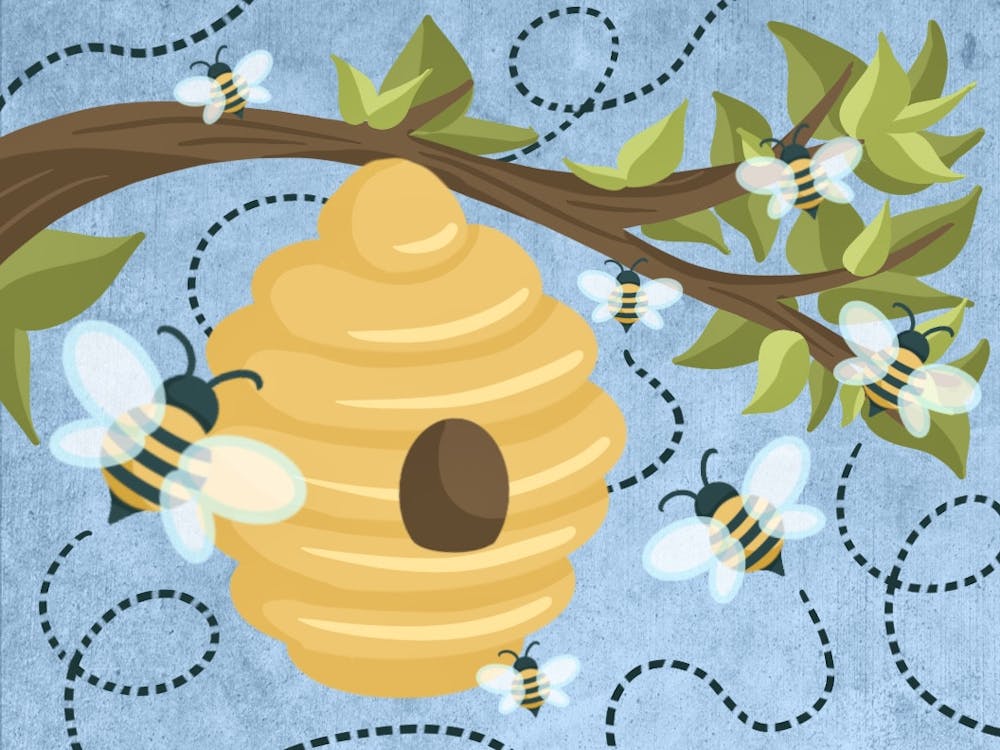Dave Conser is a big believer in nominative determinism, or when a name predicts one’s career.
His last name makes up the beginning of the word conservation — marking the beginning of a life dedicated to preserving nature.
“I've just always enjoyed the natural world,” Conser said.
Now as the city arborist, studying and cultivating trees, Conser, 65, is one of several people involved with Gainesville’s new bee city initiative.
The Gainesville City Commission voted to become a bee city in 2022 and was officially granted the designation Jan. 25 by the Xerces Society, a group committed to insect conservation.
After becoming officially certified, the Gainesville Bee City Committee gathered Feb. 6 to determine their next course of action.
As a certified bee city, the city has pledged itself to the conservation of bees and other pollinators as well as their habitats.
Gainesville is already well known for its green spaces, and now, new spaces will be added to help bees throughout the pollination process. The city will be planting native flowers in several public parks and gardens.
Gainesville holds the state record for the highest percentage of canopy cover, the proportion of the ground covered by vegetation, Conser said, which is something he said he’s proud of. He beamed each time his father-in-law would visit from Clearwater to say “it’s so green” when passing by the trees.
When Gainesville became a certified bee city, he said his pride only grew.
“I'm really excited about this,” Conser said. “I'm stoked about it. I think it's a great project and just a great opportunity for Gainesville.”
As a bee city, Gainesville will work toward maintaining, enhancing and growing the natural habitat of bees. This includes more native plant cultivation, pesticide elimination and excessive water reduction.
These measures ensure Gainesville will have places for bees to collect resources as they pollinate local plants and other crops. Other pollinators will also benefit from this increase in native plantings.
UF’s Honey Bee Research and Extension Laboratory has studied bees’ impact on the environment for several years.
Based on current research, Louis Dennin, extension coordinator for the lab, said he believes this initiative will help maintain stronger bee colonies.
Honeybees are exposed to several stressors that can negatively impact their colonies. One of the top three stressors the UF Honey Bee Lab researches is poor nutrition, Dennin, 26, said.
This is where the bee city initiative comes in. Planting more native flowers will alleviate poor nutrition in bee colonies by providing more forage space, places where bees can collect nectar and pollen. This gives them plenty of food so they can continue their endless work, he said.
Honeybees don’t only produce honey — bees also play a role in food supply.
“Honeybees are estimated to pollinate anywhere between one-fifth and one-third of the food that we eat, depending on who you ask,” he said. “Either way, that's a really, really big percentage.”
Honeybees aren’t the only bee species that will benefit from the new initiative.
There are about 3,600 species of native bees in the U.S., and Florida has around 300, Dennin said. These bee species not only help maintain healthy agriculture, but they also increase biodiversity in the area and help the ecosystem as a whole.
“Bees will contribute to plants, which contribute to animals, which contribute to other species of insects,” Dennin said. “Ecology is always all stacked on top of each other. Things tend to domino effect.”
The city will begin identifying places to plant native flowering species with the help of the Florida Wildflower Foundation.
Stacey Matrazzo, the 51-year-old executive director of the Florida Wildflower Foundation, said she hopes to place these habitats in publicly accessible locations like parks, green spaces and community gardens.
This initiative is an opportunity to educate Gainesville residents on the value of bees at home, not just on an agricultural scale, she said. Planting native flowers and enhancing pollinator habitats can help people reduce their reliance on chemicals and heavy watering as well.
Residents will even be able to do so at home, Matrazzo said.
Matrazzo believes it could bring native plants and animals back to spaces where a lot of urban development has occurred, she said.
“It's going to benefit everybody, whether they understand it or not,” Matrazzo said. “We're all interconnected.”
Gainesville is looking at updating a community garden to begin the initiative, Conser said.
It’s a small start, he said, but they have large ambitions. Eventually, they want to take on a project called the Waldo Road Greenway.
“We're talking about perhaps converting that entire area into a pollinator habitat,” he said. “Get wildflowers going there.”
Conser also wants to remind people native plants have a cycle. During spring and summer, these spaces will be filled with native flowers and a myriad of insects, birds and other pollinators.
But the purpose of these habitats may be less clear when the plants die during the winter.
“Folks need to understand that when they're looking at something less neat, less tidy, you might be looking at something really great,” Conser said.
Contact Aubrey at abocalan@alligator.org. Follow her on Twitter @aubreyyrosee.
Aubrey Bocalan is a third-year journalism major. She is also pursuing a double major in Art. When she isn't writing, she's probably watching TV with her dog, Albus Percival Wulfric Brian Dumbledore Bocalan.






